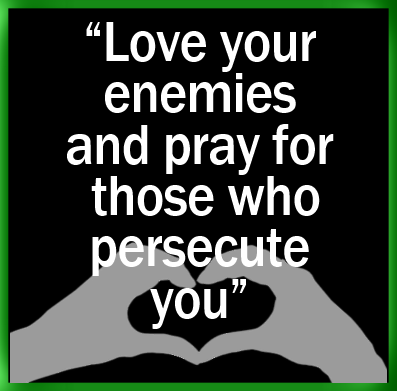Readings: Leviticus 19:1-2,17-18; 1 Corinthians 3:16-23; Matthew 5:38-48
‘You cannot be serious’ is the title of John McEnroe’s bestselling autobiography published in 2002. The name of the book comes from McEnroe’s famous reaction to a decision of the umpire, with which he disagreed, in his match against Tom Gullikson at the 1981 Wimbledon Championships. I suspect that our first reaction to the teaching of Jesus in today’s gospel passage would be exactly the same. ‘You have learnt how it was said: “Eye for eye and tooth”. But I say this to you: Offer the wicked person no resistance. On the contrary, if anyone hits you on the right cheek, turn the other also. If anyone wants to sue you and take your coat, give your cloak as well; if anyone forces you to go one mile, go also the second mile’ (Mt 5:38-41).
The words of Jesus cut across the grain of our natural reaction to those who treat us, or our loved ones, unjustly: We wonder how any self-respecting person could follow such advice. Are we not to stand up to evildoers? Most of us would agree with the oft-quoted statement, wrongly attributed to Edmund Burke, that ‘the only thing necessary for the triumph of evil is for good people to do nothing’. Are we to ‘stand idly by’ in the face of unjust aggression? While Jesus may not be advocating complete passivity in the face of evil he is certainly calling for a level of restraint most of us find difficult, if not impossible.
To appreciate the teaching of Jesus, we need to know something about the situation in Israel at the time Jesus lived. Israel was under Roman occupation, like parts of Ukraine today are under Russian occupation. Roman soldiers were everywhere and treated Jewish citizens harshly. If a Roman officer tapped a Jew on the shoulders with his sword, he had to do whatever the officer commanded him to do. We can recall the example of Simon of Cyrene, whom the Roman soldiers commandeered to carry the cross of Jesus. Understandably, the Jews hated the guts of the Romans and revolutionary groups like the Zealots sought to liberate Israel from Roman domination and regain independence.
 Jesus, too, wanted a revolution – a revolution of unrestricted love, not of hatred and the desire for revenge. The law of limited retaliation – ‘eye for eye and tooth for tooth’ (Ex 21:24) – proposed in the Old Testament to curb the desire for revenge, could never break the cycle of violence that continues to hold our world in its grip. Jesus wanted a world transformed by the power of love; a world where the barriers of distrust are overcome and the legacies of hatred dissolved; a world where hurts are healed by compassion and misunderstandings dissipated by forgiveness. Therefore, Jesus calls on his disciples – and on us – not to retaliate at all but to absorb unjust aggression, without seeking to be avenged. He is asking even more of us. He is calling on us to imitate the love of our heavenly Father ‘who causes his sun to rise on bad people as well as good, and his rain to fall on honest and dishonest people alike (Mt 5:45). He is challenging us to extend the horizon of our love beyond the immediate circle of those we normally consider to be our neighbours, and include even those who may want to destroy us: ‘love your enemies and pray for those who persecute you’ (Mt 5: 44).
Jesus, too, wanted a revolution – a revolution of unrestricted love, not of hatred and the desire for revenge. The law of limited retaliation – ‘eye for eye and tooth for tooth’ (Ex 21:24) – proposed in the Old Testament to curb the desire for revenge, could never break the cycle of violence that continues to hold our world in its grip. Jesus wanted a world transformed by the power of love; a world where the barriers of distrust are overcome and the legacies of hatred dissolved; a world where hurts are healed by compassion and misunderstandings dissipated by forgiveness. Therefore, Jesus calls on his disciples – and on us – not to retaliate at all but to absorb unjust aggression, without seeking to be avenged. He is asking even more of us. He is calling on us to imitate the love of our heavenly Father ‘who causes his sun to rise on bad people as well as good, and his rain to fall on honest and dishonest people alike (Mt 5:45). He is challenging us to extend the horizon of our love beyond the immediate circle of those we normally consider to be our neighbours, and include even those who may want to destroy us: ‘love your enemies and pray for those who persecute you’ (Mt 5: 44).
It is difficult at any time to embrace Jesus’ teaching on the love of enemies. It is especially difficult in our time when we see the unjust suffering of so many innocent people. I am sure many of you, like myself, find it hard not to react with anger when we hear reports of the atrocities inflicted on the people of Ukraine by President Putin and his Russian army. We easily identify with the Ukrainian President’s call for military support to defeat the Russians, even as we pray for peace. We are conflicted. We want peace but we also want to see evildoers defeated. It is difficult to deny the truth of Alexander Solzhenitsyn’s statement that ‘The line separating good and evil passes not through states, nor between classes, nor between political parties either – but right through every human heart – and through all human hearts.’
As difficult as the precepts of Jesus may sound, they embody the highest ideals of Christian life and virtue. They challenge us to respond to darkness with light, to respond to what is worst in others with what is best in us, and, in the words of St Paul, ‘to conquer evil with good’ (Rom 12:21).
During his recent visit to the Congo and South Sudan, Pope Francis listened to many heart-rending stories of people who had suffered atrocities during the ongoing conflicts in these countries. In one of the most moving scenes of his trip, a number of survivors stated that they had forgiven those who had inflicted shocking violence on them; and they knelt in front of the Pope as he blessed them. Pope Francis went on to call on ‘those who call themselves Christian’ to do everything in their power to ‘break the cycle of violence… Even if our hearts bleed for the wrongs we have suffered, let us refuse, once and for all, to repay evil with evil. So, we pray for the grace and courage to embrace the way of Jesus and imitate the unrestricted love of our heavenly Father. Amen
Michael McCabe SMA
To listen to an alternative Homily for this Sunday,from Fr Tom Casey of the SMA Media Centre, Ndola, Zambia please click on the play button below.
|
|

